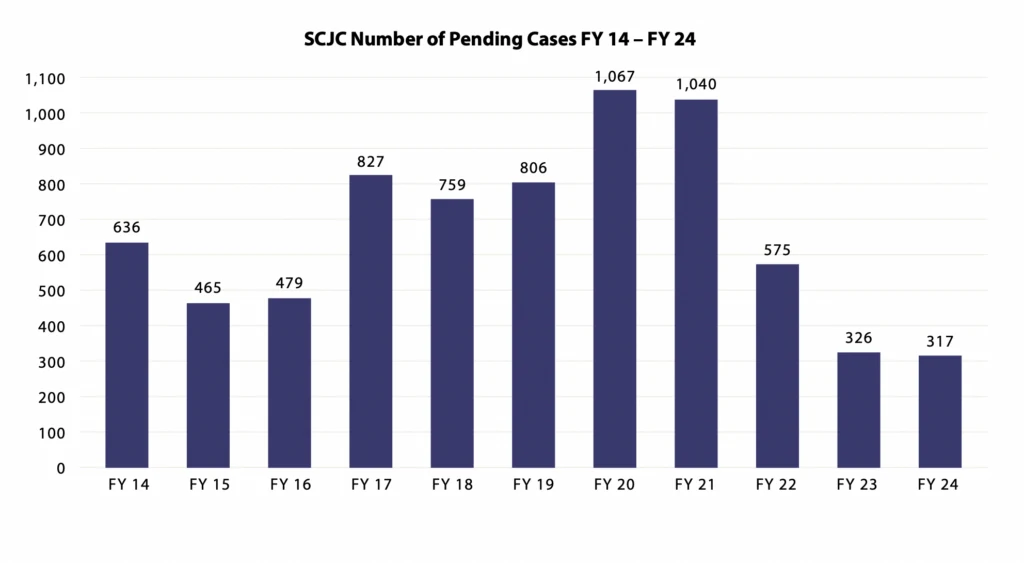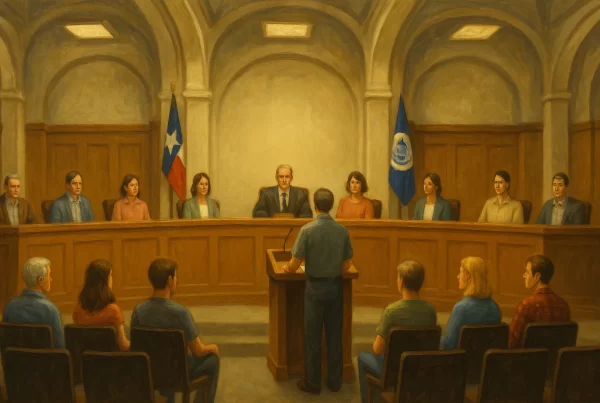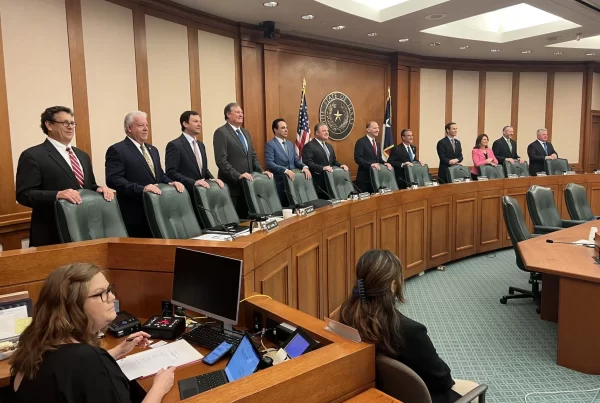The Texas Commission on Judicial Conduct is an independent state agency responsible for investigating allegations of judicial misconduct and unfitness for office.
It was established by constitutional amendment in 19651 and is further governed by statute.2 Its original name was the Texas Judicial Qualifications Commission and there were only nine members. Today, the commission has 13 members, some of whom are appointed by the Texas Supreme Court, others by the State Bar, and others by the Governor.
“The mission of the State Commission on Judicial Conduct is to protect the public, promote public confidence in the integrity, independence, competence, and impartiality of the judiciary, and encourage judges to maintain high standards of conduct both on and off the bench.”
Jurisdiction
The Texas Commission on Judicial Conduct has jurisdiction over all sitting Texas judges, including municipal judges, justices of the peace, criminal magistrates, county judges, statutory probate judges, district judges, appellate justices, retired and former judges who consent to sit by assignment, and judges pro tempore.
The Commission also has limited jurisdiction to hear cases involving judicial candidates (those seeking office as a judge, who are not yet elected), but only for a select number of offenses.
The Commission has no jurisdiction over federal judges and magistrates, administrative hearing officers, or private mediators or arbitrators.
Membership
According to the Constitution, the commission must include:
- One Justice of a Court of Appeals, one District Judge, one Judge of a County Court at Law, one Judge of a Constitutional County Court, one Justice of the Peace, and one Municipal Judge, chosen by the Supreme Court with the consent of the Senate;
- Two lawyers who have practiced law for over ten years, chosen by the State Bar board of directors with the consent of the Senate;
- Five non-lawyers, at least thirty 30 years of age, who don’t hold any salaried public office or employment, appointed by the governor with the consent of the Senate.
The commissioners serve staggered terms of either four years or six years. They receive no compensation for their services, though they may be reimbursed for expenses.
Disciplinary Processes
There are several ways that the Texas Commission on Judicial Conduct may approach a disciplinary case, according to the state constitution.
After investigating a case of suspected misconduct, the Commission may issue a “private or public admonition, warning, reprimand, or requirement that the person obtain additional training or education.” Alternatively, the Commission may start formal proceedings against a member of the judiciary and order a formal hearing to be held before it.
A third option is to request the Texas Supreme Court to appoint an active or retired district judge or appellate judge, or a retired justice of the Court of Criminal Appeals or Supreme Court, who will serve as a “Master” to hear and take evidence in the matter, and to report about it to the Commission.3
The state constitution says, “The Master shall have all the power of a District Judge in the enforcement of orders pertaining to witnesses, evidence, and procedure. If, after formal hearing, or after considering the record and report of a Master, the Commission finds good cause therefor, it shall issue an order of public admonition, warning, reprimand, censure, or requirement that the person… obtain additional training or education.”4
If the Commission wants to remove a member of the judiciary, it may refer the case to a review tribunal consisting of seven judges of the regional Courts of Appeals who are selected randomly by the Chief Justice of the Supreme Court.5
The job of the review tribunal is to read all the evidence uncovered by the Commission, and to consider additional evidence as necessary. It must then take action within 90 days, either by dismissing the case or ordering the removal of the accused from office, or some other censure.
Rights of the Accused
The Texas Constitution grants certain procedural rights to persons accused before the Commission and review tribunals, including the right to notice, counsel, hearing, and confrontation of one’s accusers.
Persons accused before the Commission on Judicial Conduct also have the right of appeal.
They may appeal a decision of the Commission or a review tribunal to the Supreme Court.
Finally, if a judge or magistrate is forcibly removed or retired from office, he or she does not lose retirement benefits. The Constitution says, “The rights of an incumbent so retired to retirement benefits shall be the same as if his retirement had been voluntary.”
Meetings and Administration
The Constitution allows the Commission on Judicial Conduct to meet where and when it wants to, though it must meet in Austin at least once each year. The members of the commission every year select one of their own members to serve as chairperson.
A quorum consists of seven members, and the commission may take action on the basis of a majority vote of those present. The one exception to this rule is for recommendations for retirement, censure, suspension, or removal of any person holding an office. That requires an affirmative vote of at least seven of 13 members.6
In addition to the Commissioners themselves, the Commission has a support staff of about a dozen people, including an executive director, general counsel, legal staff, and administrative staff. The Commission’s office is located at 300 West 15th Street in Austin (map).
Number of Cases Annually




